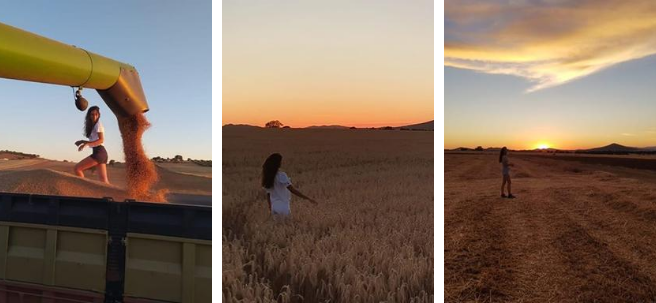
11 de August de 2020
Innovación
August 11, 2020. Lorena Guerra Sánchez, 32, is originally from Fuente Obejuna (Córdoba). She studied Agricultural Engineering because she loved everything related to farming since she was a child. After graduating, she worked in several private companies, but one day her father asked her if she wanted to work for herself or for someone else. And at that very moment, she joined the family business as a farmer, alongside her father and brother.
- Lorena Guerra—a young engineer and farmer who is a hit on Instagram—talks to the National Rural Network about rural work and life and new technologies.
 |
18,300 followers on Instagram ( @agricola_lorew ). That's the staggering number Lorena manages on her favorite social network, where she focuses on showcasing her work from the tractor every day. Lorena believes she can help many young people who are undecided about whether or not to work in the fields.
For her digital and rural work, Lorena has already received two awards: the 2018 Agrophoto Award for her harvest photos on Instagram and the "Recognition for Sustainability in Rural Areas" from the Rural Development of the Alto Guadiato Valley: "I honestly didn't expect the recognition I received in Bujalance, like so many things that are happening to me through Instagram. It was recognition for bringing visibility to the rural world through my account day after day."
RRN: What is your daily life like?
Lorena Guerra: Depending on the time of year and the weather, we do one thing or another. In the morning or the day before, my brother and I plan what we have to do. We meet at a specific time and head to the field. Some days we eat in the field and others we don't. Some days we go earlier—like now, when we meet at 3 a.m. because it's bale season—and other days we have to wait until the harvest is clear. As farmers, we're always looking at the weather ; we depend on it constantly.
RRN: And what is life like for a young person in rural areas?
LG: During the workday, it's very similar to life in the city. In other words, each person performs their job according to their profession, and that's it. The biggest differences are in leisure time, which obviously offers fewer opportunities. But it also depends on each person's lifestyle. If you like big parties, crowds, or cultural activities, there are obviously fewer opportunities in rural areas. But if you lead a life more connected to nature and outdoor activities, the village is the best place to enjoy it.
RRN: What do you think the rural world needs to be complete and not miss the city?
LG: Mainly, it lacks people (laughs). Because there are few of us here. And sometimes you don't have anyone to go running with or get a drink. If there were more people, there would also be other services in our towns: schools, daycare centers, educational and leisure activities, bars, shops, cinemas... But today, with the help of new technologies , we have more services covered. For example, watching a movie, buying clothes, taking a course, or a thousand other things, are now activities we can do without leaving our town.
RRN: Do you think social media can change and transform the image of the rural world?
LG: I hope so, and for the better. I think there's a lot of ignorance in cities about what life is like in rural areas and about our work as farmers.
I share my daily life on Instagram . And many people from cities follow me and like what they see. They're interested in my work and ask me all kinds of questions. Sometimes the questions are so mundane that they surprise me. But that's when I realize the lack of knowledge and the huge gap between the countryside and the city.
RRN: In the wake of the pandemic and lockdown, many people are now turning to the rural world. First, because they have been the providers of food in the cities. Second, because the quality of life longed for during lockdown has been rural life. Do you think there will be a change, a migration, or a flight from the city to the countryside?
LG: It's time to value the primary sector . During this lockdown, the importance of our sector has been evident. We've continued working and producing food for all citizens. This recognition doesn't translate into prices, unfairly.
I don't know if all the people who now want to return to their villages will actually do so. I hope so. If more people come to live in our villages, they'll be delighted and welcome. Rural depopulation is a serious problem, and this pandemic may reverse this situation. Although the important thing to be able to live in rural areas is to have decent, paid employment.
RRN: How have you experienced confinement?
LG: At first, I was afraid. I suppose like everyone else. Then, I felt the peace of mind of living in an area where there have been very few cases, and with the possibility of continuing to work. I understand that there are many other self-employed workers or workers who have had to stay home without income or even incurring losses. I recognize that in the agricultural sector, we are privileged.
RRN: What are your medium and long-term plans?
LG: I see myself working in what I love, which is farming. I enjoy my profession and want to continue as a young farmer. I wouldn't rule out trying some lesser-known crops in this area. And I also wouldn't rule out doing some social media-related work. Don't waste opportunities that arise; as they say, the train only passes!









